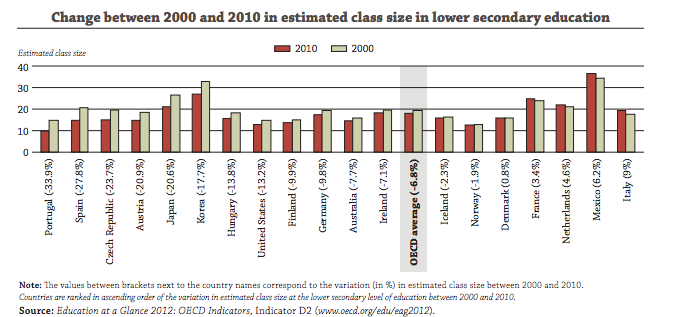This morning on CBC Vancouver’s Early Edition BC Education Minister Peter Fassbender misrepresented the position of Organization of Economic Cooperative and Development (OECD) regarding the impact of class size on educational achievement.
(It should be pointed out that focusing on educational achievement, as measured by standardized tests, such as OECD’s PISA test, is necessarily a very narrow conception.)
At one point in the interview Fassbender said he had seen research from the OECD and had discussions with representatives of the OCED and remarked:
“[OECD representatives] clearly have said that composition plays more of a role [than class size] and the quality of the teacher in classroom is much more important.”
Of course, we don’t know what studies he saw or who he talked to, but the implication that OECD data and recommendations dismiss the effects of class size on student achievement is at the very least problematic.
The OECD position is a more complex and Fassbender conveniently omits a key point OECD makes about teacher pay. Reporting on trends between 2000 and 2010, the OECD says there are two main reforms undertaken in OECD countries over the last decade:
- reducing class size;
- increasing teachers’ salaries.
The OECD reports that between 2000 and 2010, teachers’ salaries increased on average by about 14% at the lower secondary level, while estimated class sizes decreased on average by 7%.
The OECD describes what member nations are doing based upon analyses of data from the Pisa test, which it administers, this way:
in a period of economic crisis and tightened public budgets, while analyses of OECD data do not establish a significant relationship between spending per student and average learning outcomes across countries, Pisa data shows that high-performing education systems are commonly prioritising the quality of teachers over class size.
The OECD points to a number of countries (some with below average class sizes, e.g. Austria and Estonia; some with above average class sizes, e.g., Mexico and Turkey) where principals report that a shortage of qualified teachers hinders instruction. And OCED offers this rather obvious conclusion:
…reducing class size is not, on its own, a sufficient guarantee to improve the quality of education systems.
Lastly, Fassbender describes OECD as “the experts on international education.” OECD is certainly an influential organization, but is primarily a statistical agency that compares national policies and is committed to expansion of world trade. Fassbender’s description of OECD is again, an overstatement.
